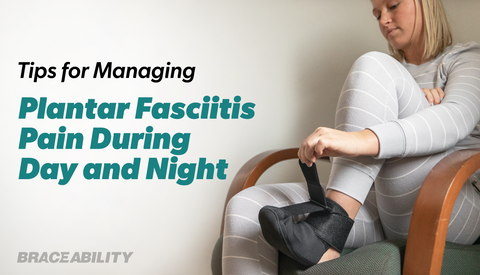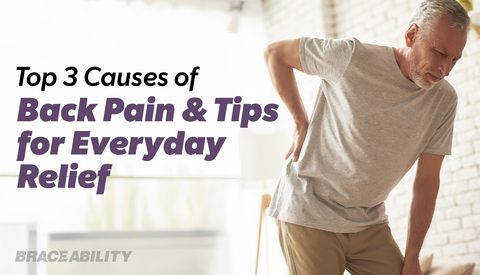5 Ways Your Weight Impacts Your Joints
If you’re experiencing discomfort in your knees, back or hips while walking, climbing stairs, or performing other daily activities, you are likely dealing with joint pain. Having achy, sore joints is common, but it is not normal and can get frustrating as you attempt to find the root problem of your pain. The connection between weight and your joints is a crucial one to be aware of. Keep reading to find out just how big of an impact your weight can have on your aching joints.
The Link Between Weight and Joint Pain
Weight can be a touchy subject, between dieting, workout routines, and everything else that is so commonly talked about, it can be a lot to take in and losing weight is easier said than done. Sore and achy joints are common and while you may have accepted the pain that comes along with walking, bending down, or climbing stairs to become your new normal, it does NOT need to be the case.
The health of our joints (the areas where two bones meet) is crucial when it comes to our ability to move without pain. Weight is likely the culprit for the aches and pains you may be feeling in the joint areas as you walk, and move around throughout the day. Our weight and joints happen to be directly related to one another. The more weight we place on our joints, the more achy pains we receive, unfortunately. But, on the bright side this weight-induced joint pain can be fixed.

Weight Loss vs. Weight Gain
To begin healing your joint pain, it’s important to understand what is causing it. While we will focus mainly on excess weight, it is not the only factor that can cause joint pain. Most commonly talked about, are the disadvantages and health risks that weight gain can bring you, however, many people experience joint pain during a major weight loss as well. The difference in the weight, pressure, and stress on your joints can cause the same effect during weight loss. This makes it very important to pay close attention to your joints, protecting them during workouts, stretching, etc., to ensure you avoid joint-related pain. Take the time to stretch, listen to your body, and practice recovery methods after working out, or extreme use of the body and joints to protect and avoid further pain.
5 Common Ways Your Weight is Affecting Your Joints
-
Additional Pressure
Not surprisingly, excess weight puts additional pressure on your joints. So, what does this “additional pressure” mean for your body? The weight-bearing joints in your body are built for a certain amount of weight, so when the joints experience added pressure from excess weight, they will often become sore and worn down, causing aching pain. In fact, every pound of body weight adds 5 pounds of extra force, or pressure onto your knees with every step you take.

Curious if you are considered overweight or obese? Use our BMI calculator for quick and easy results, without a lot of math or calculations.
-
Increased Inflammation
Are you experiencing painful swelling in your joints? This could be directly related to your weight. Weight gain causes inflammation, which leads directly to reduced mobility of your knees, hips, shoulders, and ankles, making it more difficult and painful to accomplish daily tasks, even walking and standing. Obesity is directly associated with this chronic inflammation and swelling, which can lead to other diseases such as atherosclerosis, diabetes, and even cancer. Reducing inflammation and swelling can allow a fix for weight-induced joint pain, try the following tips for reducing inflammation:
- Add anti-inflammatory foods to your diet (grapes, celery, blueberries, garlic)
- Control your blood sugar
- Practice regular exercise
- Manage your stress
Keep in mind that the process to reduce and eliminate inflammation is not a quick fix, it will take time in order for your body to fully heal. Reducing inflammation pays off over time and will ultimately improve your health, pain levels and reduce your risk of chronic pain or disease.
-
Osteoarthritis & Obesity
Being overweight accelerates osteoarthritis, especially in the hips and knees. With osteoarthritis, your joints will begin to wear and tear. Osteoarthritis causes the cushioning within a joint to deteriorate, leading to bones rubbing directly against each other, which will cause an irritating pain. The more weight on the joint, the more wear and tear, the more irritating pain. It’s no surprise that pain caused by osteoarthritis will make things as simple as walking, bending down, and climbing stairs more difficult and painful. In order to keep up with your daily activities, for extra support, try out an arthritis knee brace to ease the amount of pressure on your joints.
-
Health Risk Connections
It’s no secret that being considered overweight comes along with various health risks. We hear about them all the time, but what does this mean when it comes to the joint pain that you’re feeling right now? The negative impacts associated with obesity can be extreme, so it’s important you stay on top of your health and understand the risks that come along with excess weight. Some health conditions caused by obesity that are commonly talked about include diabetes and heart disease. However, the wear and tear on the bones, tendons, and joints that are caused by obesity can lead to an early onset of conditions such as:
- Osteoarthritis
- Tendonitis
- Soft tissue damage
- Pre and post-operative complications
Talk to your doctor or medical professional to find the best way to help treat and prevent pain from any weight-related health conditions you may be experiencing.
-
More Stress, More Pain
Overall, the more stress you add to your weight-bearing joints, the more pain you will be in. Your lower body, especially your knees and hips happen to bear most of your weight, which contributes directly to your achy, stiff, and swollen joints after years of stress brought on by excess weight. If you have weight-related joint pain, losing pounds can greatly impact the pain you’re feeling. Taking the stress off of your joints is likely to ease your symptoms, and help arthritic joints feel better while preventing further damage and pain from occurring.
Finding Your Realistic Fix: The Road to Recovery
Losing weight is not an easy, or quick process, especially when you are in pain. Workouts aren’t always made for those who are dealing with sore and aching knees, shoulders, or hips. If you’ve tried to lose weight before, don’t be discouraged. Even a minimal amount of weight loss can help reduce pain and preserve your joints.
When you are selecting your route to lose excess weight, you need to make sure it is the best, most realistic path to take. Keep these tips in mind when selecting your weight-loss routine:
- Be realistic about your pain levels
- Start slow, starting in itself is progress
- Use extra support when needed, such as a back brace or knee splint.
- Stay organized & consistent
- Take the proper steps to relieve your pain
- Protect your joints, don’t overdo it!
- Do some research and planning before diving in
Overall, losing weight will help take the stress, pressure, and pain away from your joints, but it won’t be an easy process. Even the smallest amount of weight loss can help your joint pain, so simply starting your weight loss journey, even in the smallest way will be beneficial.












